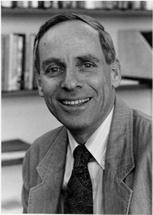 Tversky
Tversky 
 Tversky, Amos
Tversky, Amos 
 Amos is a dominant figure in cognitive psychology and behavioral decision theory. Three research int erests dominate Amos's published output: cognitive illusions, decision making, and the foundations of measurement. A very crude count of papers I felt I could categorize from memory or title yielded counts of 50, 38, and 25 for these three topics.
Amos is a dominant figure in cognitive psychology and behavioral decision theory. Three research int erests dominate Amos's published output: cognitive illusions, decision making, and the foundations of measurement. A very crude count of papers I felt I could categorize from memory or title yielded counts of 50, 38, and 25 for these three topics. 
 Amos wrote prolifically. He was an author or editor of 8 books; a ninth, in Hebrew, is in press. He published 106 articles, many with co-authors, in a very wide variety of distinguished journals. Twelve more were in press when he died, and four more were in earlier stages.
Amos wrote prolifically. He was an author or editor of 8 books; a ninth, in Hebrew, is in press. He published 106 articles, many with co-authors, in a very wide variety of distinguished journals. Twelve more were in press when he died, and four more were in earlier stages. 
 Source: Ward Edwards, on the Decision Analysis Society Website.
Source: Ward Edwards, on the Decision Analysis Society Website. 
 Amos Tversky On June 2, 1996, Amos Tversky died of melanoma. He was born in 1937 in Israel. His unde rgraduate education was at Hebrew University. In 1965 he got his Ph.D. in Psychology from the University of Michigan, where he met and married Barbara while both were graduate students. Barbara is now a Professor of Psychology at Stanford. They had three children, Oren, Tal, and Dona.
Amos Tversky On June 2, 1996, Amos Tversky died of melanoma. He was born in 1937 in Israel. His unde rgraduate education was at Hebrew University. In 1965 he got his Ph.D. in Psychology from the University of Michigan, where he met and married Barbara while both were graduate students. Barbara is now a Professor of Psychology at Stanford. They had three children, Oren, Tal, and Dona. 
 Amos's accomplishments were recognized early and often. He joined the Society of Experimental Psycho logists in 1979, received a Distinguished Scientific Contributions award from the American Psychological Association in 1982, a MacArthur Prize in 1984, and became a member of the National Academy of Sciences in 1985. Four universities, including Chicago and Yale, awarded him honorary doctorates. His most recent honor was the Warren Medal of the Society of Experimental Psychologists in 1995.
Amos's accomplishments were recognized early and often. He joined the Society of Experimental Psycho logists in 1979, received a Distinguished Scientific Contributions award from the American Psychological Association in 1982, a MacArthur Prize in 1984, and became a member of the National Academy of Sciences in 1985. Four universities, including Chicago and Yale, awarded him honorary doctorates. His most recent honor was the Warren Medal of the Society of Experimental Psychologists in 1995. 
 After a post-Ph.D. year visiting Harvard, he returned to Israel and Hebrew University, becoming a fu ll Professor of Psychology there in 1972. In 1978 he moved permanently to Stanford's Psychology Department. He remained a Permanent Fellow of the Sackler Institute of Advanced Studies, Tel Aviv University, and traveled to Israel often during his Stanford years.
After a post-Ph.D. year visiting Harvard, he returned to Israel and Hebrew University, becoming a fu ll Professor of Psychology there in 1972. In 1978 he moved permanently to Stanford's Psychology Department. He remained a Permanent Fellow of the Sackler Institute of Advanced Studies, Tel Aviv University, and traveled to Israel often during his Stanford years. 
Top




